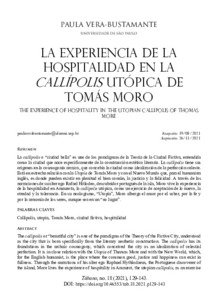Por favor, use este identificador para citar o enlazar este ítem:
https://repositorio.uca.edu.ar/handle/123456789/13303| Título: | La experiencia de la hospitalidad en la callípolis utópica de Tomás Moro The experience of hospitality in the utopian callipolis of Thomas More |
Autor: | Vera-Bustamante, Paula | Palabras clave: | Moro, Tomás, Santo, 1478-1535; FILOSOFIA CRISTIANA; HOSPITALIDAD; ESTETICA; LITERATURA | Fecha de publicación: | 2021 | Editorial: | Universidad Católica Argentina. Facultad de Filosofía y Letras. Centro de Estudiantes de Filosofía | Cita: | Vera-Bustamante, P. La experiencia de la hospitalidad en la callípolis utópica de Tomás Moro [en línea]. Tábano. 2021, 18. doi: https://doi.org/10.46553/tab.18.2021.p129-143. Disponible en: https://repositorio.uca.edu.ar/handle/123456789/13303 | Resumen: | Resumen:
La callípolis o “ciudad bella” es uno de los paradigmas de la Teoría de la Ciudad Fictiva, entendida
como la ciudad que nace específicamente de la construcción estética literaria. La callípolis tiene sus
orígenes en la cosmogonía arcaica, que concebía la ciudad como idealización de la perfección celeste.
Está en estrecha relación con la Utopía de Tomás Moro y con el Nuevo Mundo que, para el humanista
inglés, es donde pueden existir en plenitud el bien común, la justicia y la felicidad. A través de las
narraciones de su alter ego Rafael Hitlodeo, descubridor portugués de la isla, Moro vive la experiencia
de la hospitalidad en Amaurota, la callípolis utópica, como un ejercicio de aceptación de lo nuevo, la
otredad y la tolerancia. En su neologismo, “Utopía”, Moro alberga el amor por el saber, por la fe y
por la armonía de los seres, aunque sea en un “no lugar”. Abstract: The callipolis or “beautiful city” is one of the paradigms of the Theory of the Fictive City, understood as the city that is born specifically from the literary aesthetic construction. The callipolis has its foundations in the archaic cosmogony, which conceived the city as an idealization of celestial perfection. It is in close relation with the Utopia of Thomas More and with the New World, which, for the English humanist, is the place where the common good, justice and happiness can exist in fullness. Through the narrations of his alter ego Raphael Hythlodaeus, the Portuguese discoverer of the island, More lives the experience of hospitality in Amaurot, the utopian callipolis, as an exercise of acceptance of the new, the otherness and the tolerance. In his neologism, “Utopia”, More harbors the love for knowledge, for faith and for the harmony of beings, even if it is in a “no place”. |
URI: | https://repositorio.uca.edu.ar/handle/123456789/13303 | ISSN: | 1852-7221 2591-572X (online) |
Disciplina: | FILOSOFIA | DOI: | https://doi.org/10.46553/tab.18.2021.p129-143 | Derechos: | Acceso abierto | Fuente: | Tábano No.18, 2021 |
| Aparece en las colecciones: | TAB - 2021 nro. 18 |
Ficheros en este ítem:
| Fichero | Descripción | Tamaño | Formato | |
|---|---|---|---|---|
| experiencia-hospitalidad-callipolis.pdf | 443,41 kB | Adobe PDF |  Visualizar/Abrir |
Visualizaciones de página(s)
75
comprobado en 27-abr-2024
Descarga(s)
75
comprobado en 27-abr-2024
Google ScholarTM
Ver en Google Scholar
Altmetric
Altmetric
Este ítem está sujeto a una Licencia Creative Commons

